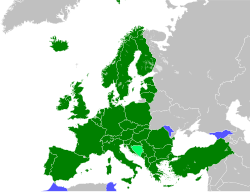| Convention on the Grant of European Patents | |
|---|---|
 European Patent Convention Contracting States in dark green, extension agreement states in light green and validation agreement states in violet | |
| Signed | 5 October 1973 |
| Location | Munich, Germany |
| Effective | 7 October 1977 |
| Condition | six States on whose territory the total number of patent applications filed in 1970 amounted to at least 180 000 |
| Signatories | 16 |
| Parties | 39 |
| Depositary | Government of the Federal Republic of Germany |
| Languages | English, French and German |
| Full text | |
| European patent law |
|---|
|
European Patent Organisation |
| European Union |
|
Eurasian Patent Organization |
|
Centralization and harmonization |
| Historical proposals |
|
|
The European Patent Convention (EPC), also known as the Convention on the Grant of European Patents of 5 October 1973, is a multilateral treaty instituting the European Patent Organisation and providing an autonomous legal system according to which European patents are granted. The term European patent is used to refer to patents granted under the European Patent Convention. However, a European patent is not a unitary right, but a group of essentially independent nationally enforceable, nationally revocable patents,[notes 1] subject to central revocation or narrowing as a group pursuant to two types of unified, post-grant procedures: a time-limited opposition procedure, which can be initiated by any person except the patent proprietor, and limitation and revocation procedures, which can be initiated by the patent proprietor only.
The EPC provides a legal framework for the granting of European patents,[1] via a single, harmonised procedure before the European Patent Office (EPO). A single patent application, in one language,[2] may be filed at the EPO in Munich,[3] at its branch in The Hague,[3][notes 2] at its sub-office in Berlin,[5] or at a national patent office of a Contracting State, if the national law of the State so permits.[6]
Cite error: There are <ref group=notes> tags on this page, but the references will not show without a {{reflist|group=notes}} template (see the help page).
- ^ Article 2(1) EPC
- ^ Article 14 EPC
- ^ a b Article 75(1)(a) EPC
- ^ Enlarged Board of Appeal decision G 7/88 (Administrative Agreement) of 16.11.1990, Summary of Facts and Submissions, V.(3)
- ^ Decision of the President of the European Patent Office dated 10 May 1989 on the setting up of a Filing Office in the Berlin sub-office of the European Patent Office Archived 13 January 2017 at the Wayback Machine, OJ 1989, 218
- ^ Article 75(1)(b) EPC